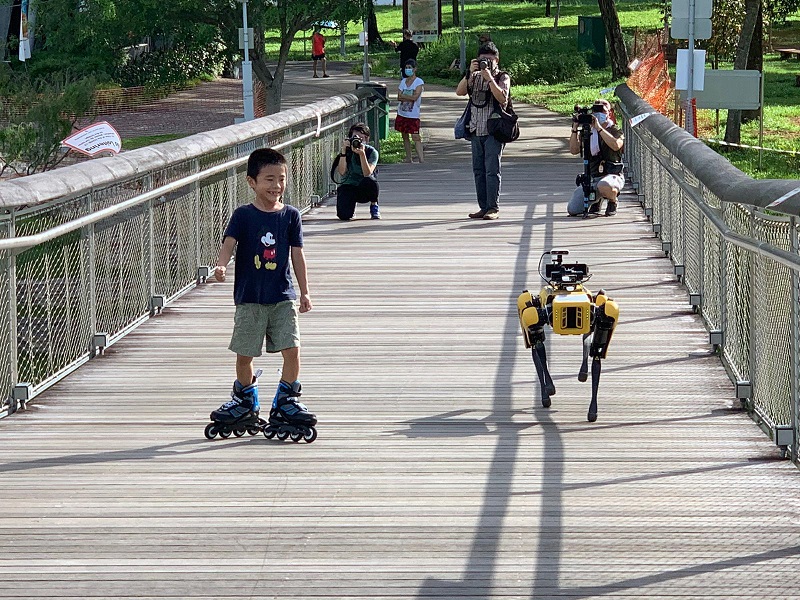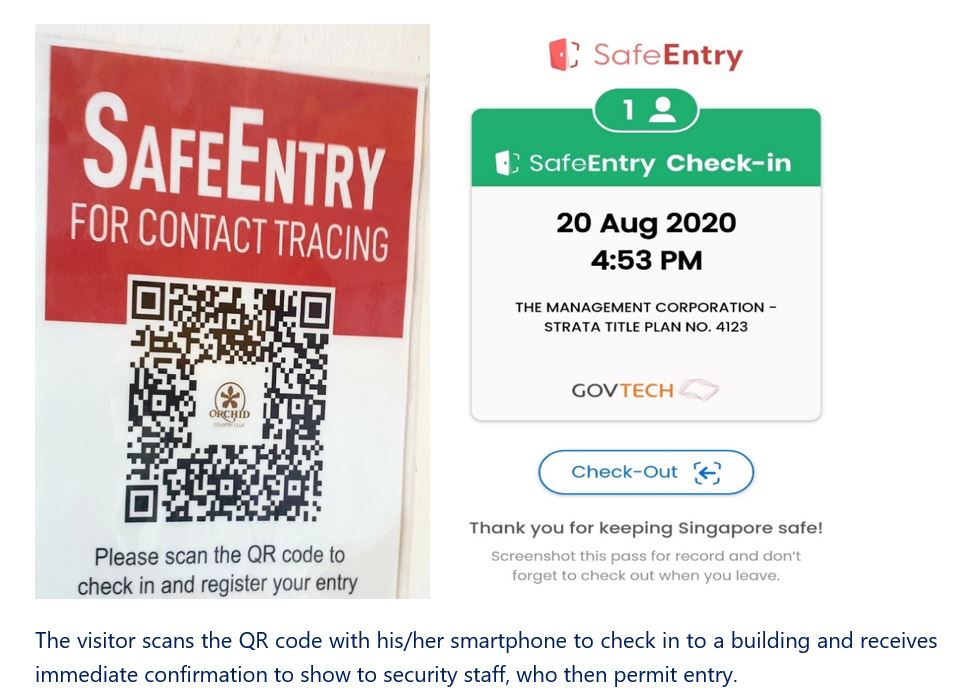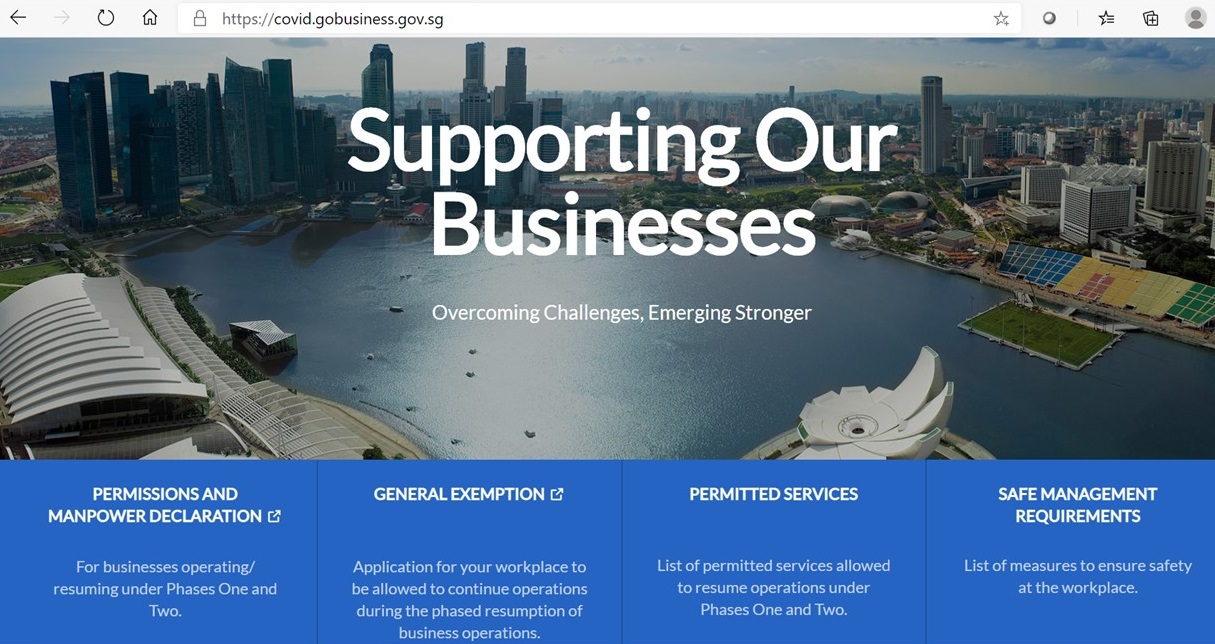

You hear a woman’s voice requesting you and other visitors to the park to observe safe distancing measures: “Let’s keep Singapore healthy. For your own safety and for those around you, please stand at least one meter apart. Thank you!” But look around and there’s no stern uniformed official behind you, but rather, Spot, a four-legged semi-autonomous robot dog, which you soon realize is the source of this public service announcement.
The remotely controlled, multi-terrain robot dog, supplied by robotics innovator Boston Dynamics, which was deployed on a recent two-week trial in one of Singapore’s largest parks, uses cameras and locally developed video analytics to estimate the number of park visitors, safety sensors to avoid collisions, and a sound system for the broadcast message. Reducing the manpower required for park patrols and avoiding contact between officers and visitors were the key objectives for the technology trial. In another pilot deployment, Spot was used to deliver payload items, such as medicines, to patients in a COVID community isolation facility. Again, the aim to minimize physical contact in the age of the deadly coronavirus.

In an email response to ARC, GovTech, the Singapore government agency responsible for developing and deploying infocomm and related engineering technologies, says it is currently assessing the outcome of the trials in advance of future implementation plans for Spot. However, the robodog is just one of its many technology responses to the pandemic, and many of these have become part of everyday life for Singaporeans as the country battles to keep the virus in check. The statistics indicate a relatively successful containment strategy, with daily infections in the community now down to the low single digits and total COVID-19 deaths at just 27. In Deep Knowledge Group’s COVID-19 Regional Safety Assessment (June 4), Singapore is ranked as the fourth safest place to live out of the 200 countries surveyed.
Perhaps the most visible sign of GovTech’s COVID-19 response technology at work in Singapore is SafeEntry, a national digital check-in, smartphone app based system that logs the name, identity card number, and mobile number of individuals entering buildings, such as schools, hospitals, hotels, and shopping malls, where there is likely to be a high density of people and hence a likely threat of virus transfer. Each building is given a unique QR code, which is displayed prominently at the entrance. Upon arrival, the visitor scans the code with his smartphone and “checks in” to the building. With the aim of facilitating tracing in the event of an outbreak, the data collected via SafeEntry is stored in a government server (for 25 days) and can be accessed by the authorities for the purpose of controlling COVID-19.

Another smartphone-based technology developed by GovTech is TraceTogether, which takes a community-driven approach to combat the spread of the virus. When phones with the (optional) downloaded TraceTogether app are nearby to one another, they exchange via Bluetooth anonymized proximity information, including the distance between users and the duration of the encounter, which is then stored, in encrypted form, on each user’s phone (for 21 days).
In the case of an outbreak, a user interviewed by a contact tracer can authorize the uploading of the TraceTogether, so that the authorities can quickly inform close contacts of confirmed cases. An alternative to the app that is targeted to senior citizens who may not own a smartphone is the TraceTogether Token. Intended as a wearable device, the tokens work in a similar way to the app by capturing proximity data using Bluetooth signals. The encrypted data is stored on the device and can be downloaded (upon consent) to aid contact tracing activities.
The Singapore government has rolled out a number of other applications aimed at mitigating the C0VID-19 crisis, including: FWMOMCare, an app under the auspices of the Ministry of Manpower (MOM) for monitoring the health status of the large foreign worker (FW) contingent in the country through self-reporting of temperature and any flu-like symptoms; SHN, a SMS and mobile web-based solution that allows people given quarantine Stay-Home Notice to report their locations to the authorities quickly upon demand; and with the wearing of masks strictly compulsory in Singapore, the MaskGoWhere website helps citizens find the designated location and time to collect a set of free masks from the government.
It is important to understand the COVID-related application developments and technology deployments as not simply Singapore’s sudden reaction to a crisis but rather as a continuum on a smart city push that began several years ago.
Launched in 2014, Smart Nation envisages a country where people live meaningful and fulfilled lives, enabled seamlessly by technology. Since then, strategic national projects launched under the Smart Nation umbrella cover has aspects such as e-payments − to facilitate seamless and secure digital transactions; urban mobility − using digital technologies to enhance public transport convenience and reliability, including the development of autonomous vehicles; and a nationwide sensor platform to improve municipal services, city-level operations, planning and security.
The Smart Nation initiative also led to the creation of the aforementioned Government Technology Agency to provide in-house smart city solution development and deployment capabilities. This June, GovTech announced an enhanced budget of S$3.5 billion (US$2.5 billion) to accelerate digitalization, with the development of new technology tools to battle COVID-19 identified as one of the five key areas of spend.
According to Dr Vivian Balakrishnan, the government’s minister helming Singapore’s Smart Nation initiative, the groundwork in terms of technology rollouts over the last six years meant the country could start from a position of strength and preparation in responding to COVID-19. Indeed, Smart Nation applications developed in the pre-coronavirus days are being enhanced to inform and assist both businesses and individuals.

For example, the GoBusiness portal, which was launched in October 2019 to ease company licensing procedures, now has a sub-portal, GoBusiness COVID, which among other things, details permitted business activities during the phased lockdowns and enables companies to submit manpower declarations and apply for exemptions. Meanwhile, LifeSG, which began as Moments of Life in June 2018, and allows citizens to access government e-services, such as birth registrations, passport applications, and road tax payments via smartphone app, is now supplemented with information including daily COVID-19 cases, border control measures, health hotline numbers, as well as details on economic relief programs.

